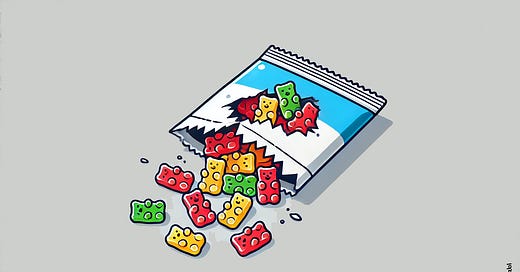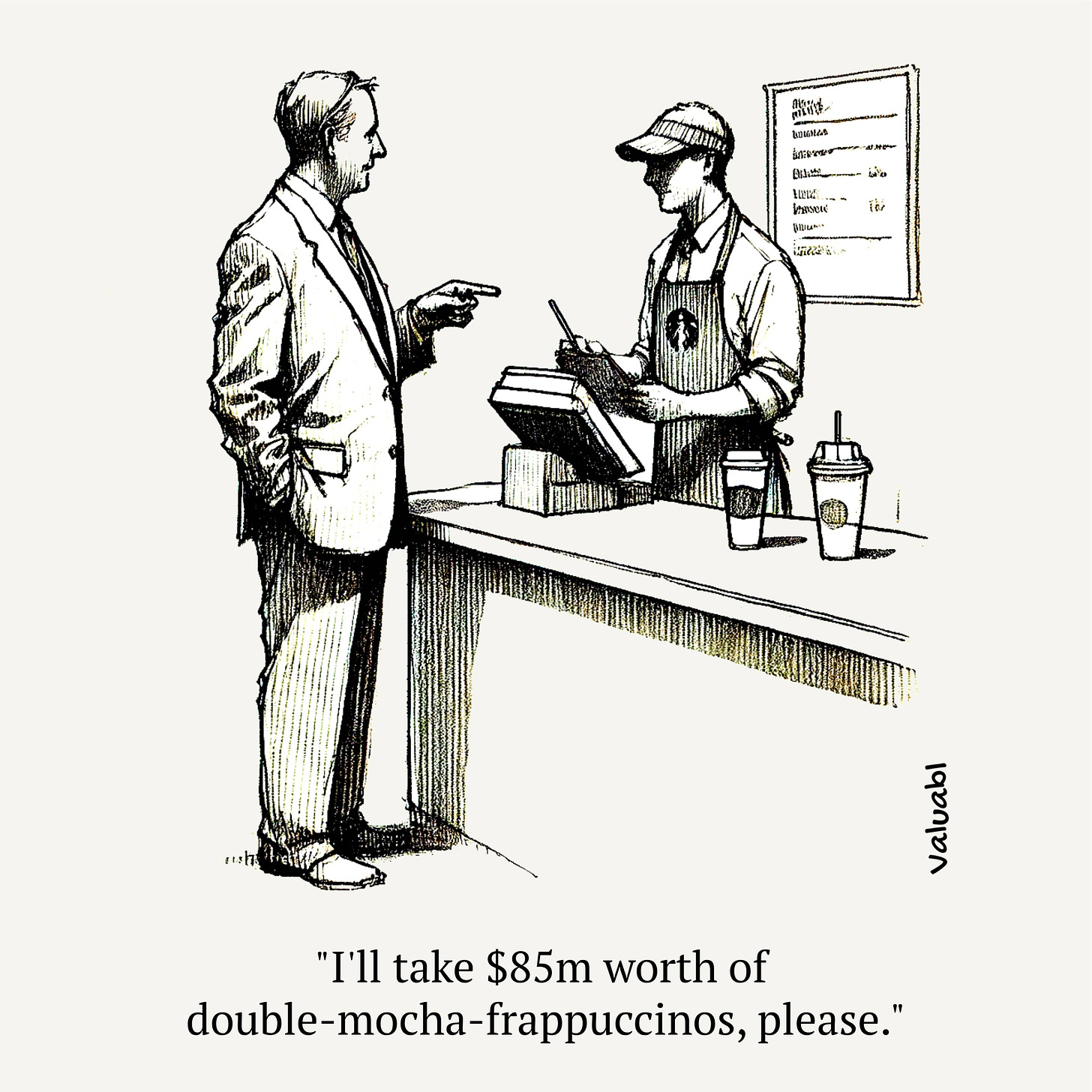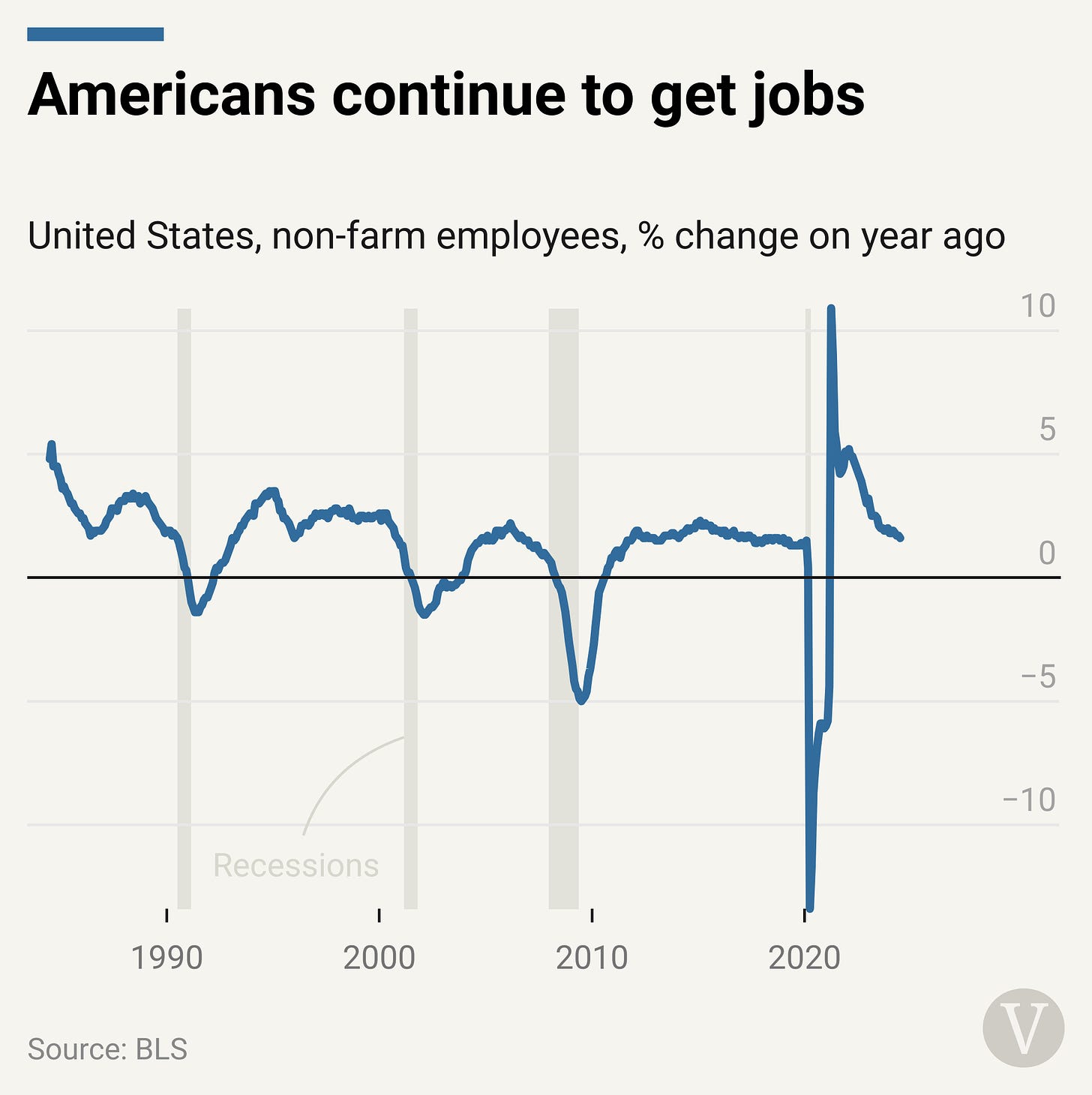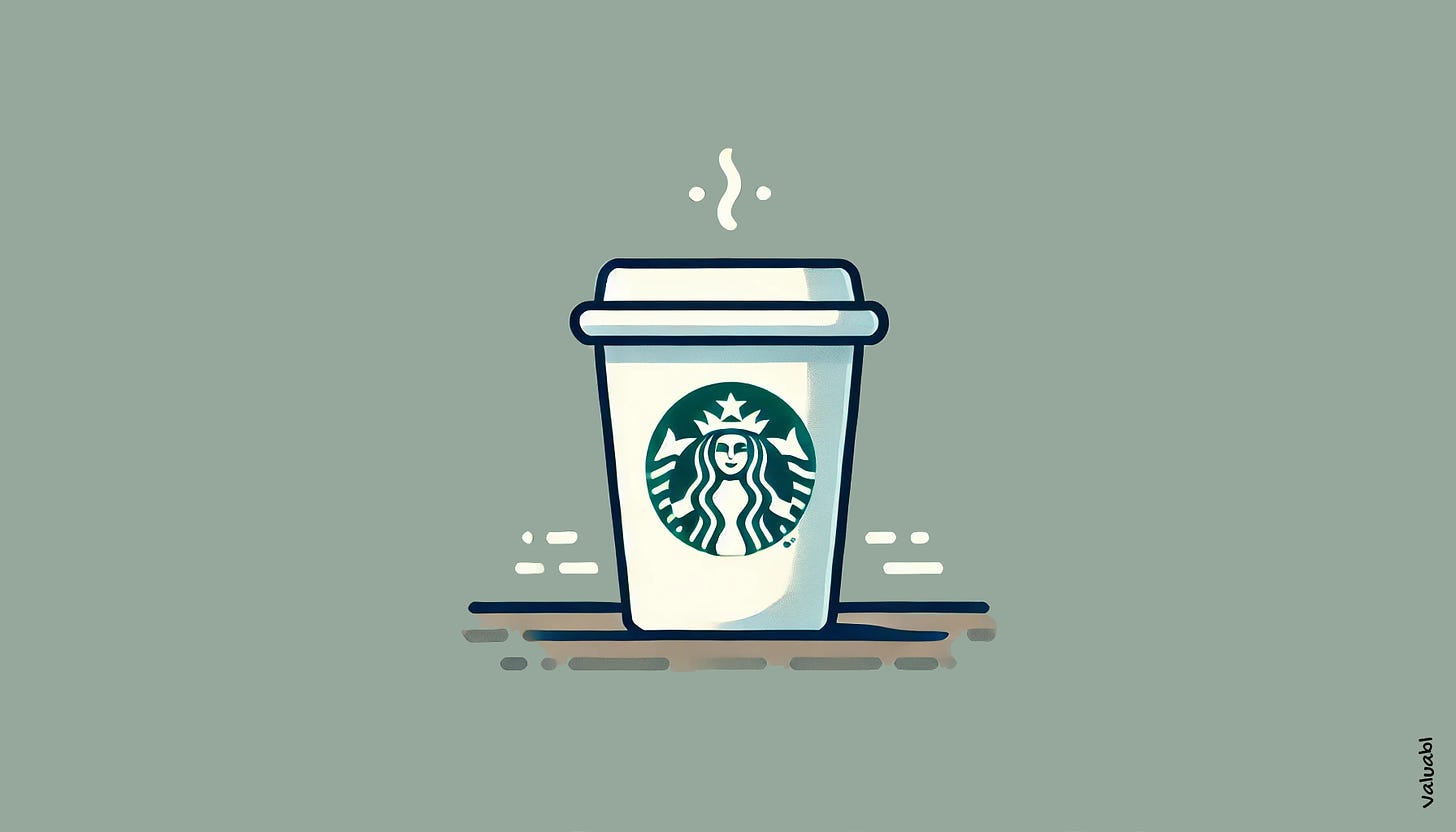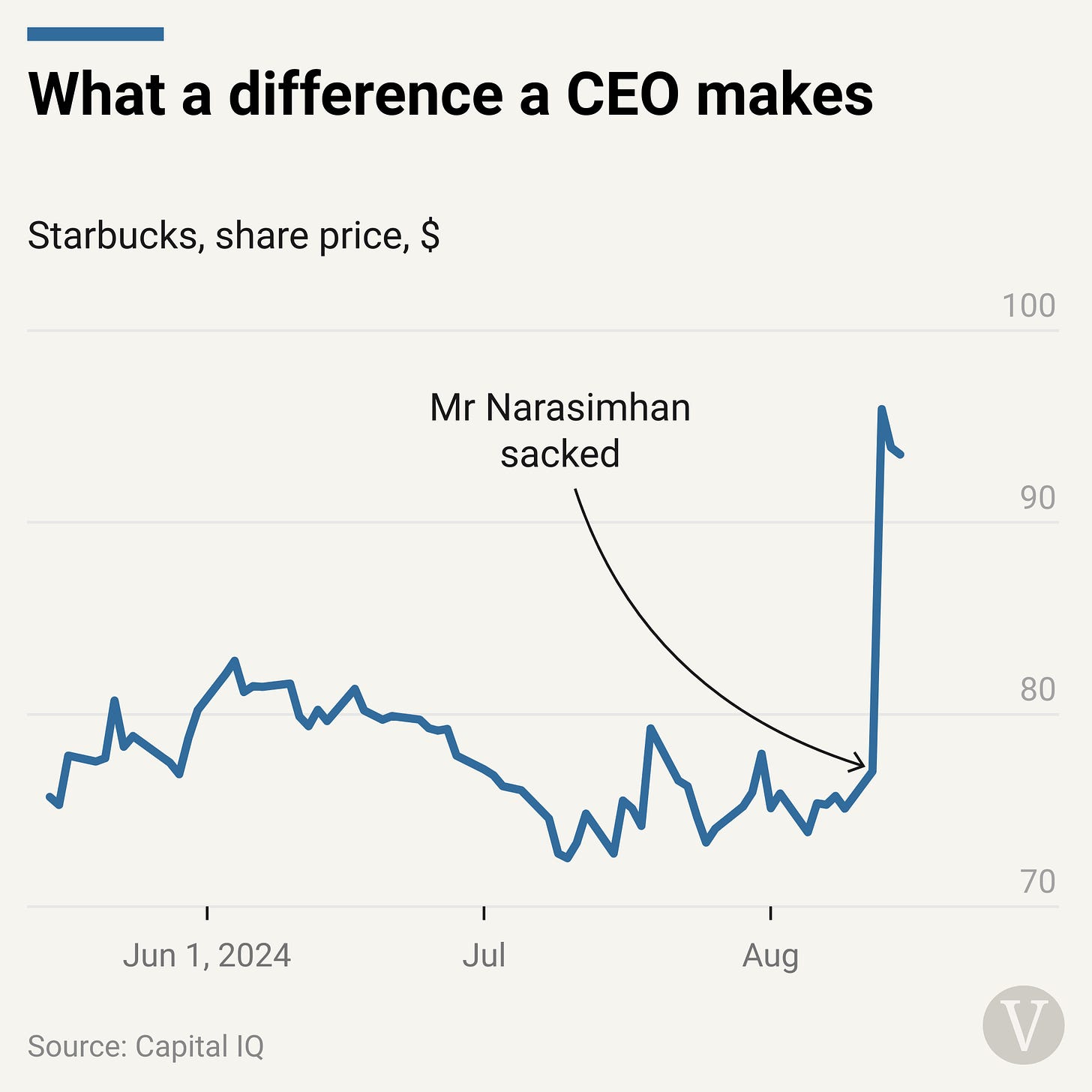Vol. 4, No. 17 — Gummy bears
This bear market doesn’t have teeth; Starbucks brings in Chipotle’s boss to turn things around; Trump is right about oil and inflation; A housewares firm with 50% upside
Contents
The world this fortnight | A summary of economic and financial news
Leader | Gummy bears
Letters to the editor | On bitcoin, China and leveraged ETFs
Finance | Daily grind
Economics | Pump ‘n dump
Cost of capital | Analysis of the ever-changing price of money
Investment idea | A housewares firm with 50% upside
Indicators | Economic data, markets and commodities
The world this fortnight
Starbucks, the world's largest café chain, surprised markets by replacing its current boss, Laxman Narasimhan, with Brian Niccol, who has led Chipotle, the burrito chain, since 2018. Mr Niccol will be the fourth person to take the helm of the struggling flat-white maker in two years. Starbucks agreed to give Mr Niccol $85m worth of cash and equity to coax him away from his current job. The company's share price surged.
Berkshire Hathaway, Warren Buffett's investment conglomerate, sold half its Apple stock in the second quarter. Mr Buffett shifted his portfolio towards short-term bonds instead. Apple reported a solid quarterly revenue and profit increase, though its sales in China declined again.
Chocolate maker Mars agreed to buy Kellanova, a cereal company, for $36bn. It will be one of the largest-ever acquisitions in the snack industry. Mars is a privately held company that owns popular brands like M&M's and Snickers, while Kellanova was spun off from Kellogg's last year and makes cereals and snacks outside America.
Elon Musk, Tesla's billionaire boss, launched a lawsuit against OpenAI, the firm behind ChatGPT, and its co-founder, Sam Altman. Mr Musk alleges OpenAI misled investors with a fake humanitarian mission. He filed a similar lawsuit earlier this year but dropped it three months later.
America's Justice Department won its lawsuit against Alphabet, Google's parent company. The judge ruled that Alphabet illegally maintained a monopoly by paying companies like Apple and Mozilla to make Google the default search engine. A judge will decide later how Google must rectify this, although the firm will appeal the decision.
Ola Electric Mobility, an electric scooter maker, raised 61bn rupees ($732m) in India's biggest initial public offering in two years on the Bombay stock exchange. The company's share price rose by 20% on the first trading day. Ola sold 330,000 scooters in the last fiscal year, doubling its sales from the previous year.
Treasury Wine Estates, Australia's largest winemaker, will sell off its cheaper brands like Blossom Hill and Wolf Blass to focus on higher-priced wines, including Penfolds and Squealing Pig. This strategic shift comes as consumers have started to drink less wine but spend more per bottle.
America's annual inflation rate dropped to 2.9% in July, falling below 3% for the first time since early 2021. The core inflation rate, which excludes volatile energy and food costs, slowed to 3.2%. Traders reckon these drops make it more likely that the Federal Reserve, America's central bank, will cut interest rates in September.
Across the pond, Britain's inflation rate rose to 2.2% in July, its first increase this year. While on the other side of the world, New Zealand's central bank responded to easing inflation by cutting interest rates by a quarter of a percentage point to 5.25%. It was the first rate cut since March 2020.
The amount of foreign investment into China fell $15bn in the second quarter, just the second time it's gone negative. These inflows have dropped from their $344bn peak in 2021. Meanwhile, sales of electric vehicles (EVs) in the country overtook those of conventional combustion engine cars for the first time. EVs are now 51% of total vehicle sales, up from 7% three years ago. ■
HOW TO VALUE STOCKS: This new book will teach you how to value any public company, guiding you step-by-step through the process with real-world examples. Whether you’re new to valuation or an experienced investor, this book will help you make better investment decisions.
Leader | America’s non-recession
Gummy bears
This bear market doesn’t have teeth
Investors are spooked. They fear bears are hiding around the corner, waiting to devour them. After all, look at the market’s reaction to July’s unemployment figures. The S&P 500 index of big American companies dropped 6% after the Bureau of Labor Statistics (BLS) announced the unemployment rate had climbed to 4.3% in July from 4.1% the previous month. This uptick triggered the Sahm rule, a little-followed but historically accurate recession indicator.
The metric proposes that the unemployment rate rose fast enough to suggest the American economy is in trouble. But, as Valuabl has argued, it’s wrong this time. Punters who sold their stocks on the expectation that a recession was inbound got burned. The market has recovered its losses and then some. So, was it a mistake to sell or short stocks on recession fears? Absolutely. There is no recession around the corner. This bear market has no teeth.
The unemployment uptick doesn’t indicate a recession this time because the labour market has expanded, not shrunk. The proportion of Yanks looking for a job but unable to find one rose because there are more people entering the job market than workers getting the sack. The number of non-farm employees rose 1.6% year-on-year in July, hardly a sign of layoffs. Moreover, the number of Americans applying for unemployment benefits for the first time is low and steady.
Picture the unemployment rate as a fraction. The number of people on the hunt for a job is on the top and the total number of folks in the labour force is on the bottom. The unemployment rate goes up if people enter the labour force because they move to America or decide to start looking for a job. That’s an entirely different dynamic to rising because workers have been given the boot. The first example, which is the current situation, means the economy has expanded. While the second, which is no the current situation, means the economy has shrunk.
This means that a collapse is unlikely even though the market looks expensive. 𝑉𝑎𝑙𝑢𝑎𝑏𝑙 reckons that investors have overvalued stocks in the S&P 500 by 10-15%. This estimator has been a decent forecaster of future corrections and returns, as expensive stocks are usually worth selling. But, while the market is a bit pricey, a collapse is unlikely unless layoffs pile up.
An increase in total employment means more workers take home a paycheque. That new income means more households have money to spend on milk, televisions and shoes, adding to companies’ top lines. And more sales means firms earn fatter profits and must hire more workers to keep up with demand—no recession. But if sackings start to take off in a big way, the economy would domino in the opposite direction as employment is a positive feedback loop. Still, that decline is unlikely to happen without a significant shock. That means you should continue to hold stocks and ignore the pundits who suggest you should short the market.
The broad lesson here is that market timing doesn’t work. The doomsayers who went short on the market because they expected a recession have already lost out. History’s lessons are clear. Using historical data for the S&P 500, 𝑉𝑎𝑙𝑢𝑎𝑏𝑙 found that your total return halved if you missed the ten best trading days of the last 30 years. Further, you lost four-fifths of your return if you missed the best 30 days.
Since three-quarters of the best days happened during the start of a new bull market, which you can only observe after the fact, you cannot pick when they happen and should stay invested. The punters who reckon a collapse is imminent will look foolish when they discover this bear is more gummy than grizzly. ■
SPREAD THE LOVE: Share 𝑉𝑎𝑙𝑢𝑎𝑏𝑙 with your friends and colleagues to look like the smartest person they know. You’ll also go into the draw to win a free six-month subscription. The will be one draw every two weeks, and winners will be notified by e-mail.
Letters to the editor
The stock market is teetering on the edge of the biggest bubble in history, and when it pops, it’ll make 2008 look like a blip. The only safe harbour in this storm is bitcoin—it’s the real deal, and when everything else crumbles, it’ll be the last asset standing.
— James Miller, Miami
China’s stockpiling (“China’s secret commodity stockpiles” Vol. 4, No. 16) is a clear signal they’re preparing to take Taiwan. Get out of Chinese stocks.
— Lily Chen, Sydney
I read your article on TQQQ (“All-in and chill?” Vol. 4, No. 16), and I think you’re missing the point. Sure, leveraged ETFs can be risky, but they also offer massive potential if you play it smart. You make it sound like anyone who touches TQQQ is doomed, but there are plenty of savvy investors who know how to manage risk and make it work. Dismissing it outright feels like fear-mongering rather than offering balanced advice.
— Mark Thompson, London
Reply directly to this email or send your commentary, critiques, and rebuttals to valuabl@substack.com. You can also direct message ValuablOfficial on X. Please include your name and city. Letters may be edited for brevity.
Finance | Giving the boss the sack
Daily grind
Starbucks brings in Chipotle’s boss to turn things around
Markets sure know how to make you feel bad about yourself. On Wednesday, the board of the world’s largest coffee chain, Starbucks, announced they’re giving the firm’s boss, Laxman Narasimhan, the sack. The stock price surged on the news, adding $22bn to the firm’s market capitalisation, the equivalent of ten Cheesecake Factories. That’s a bitter shot for Mr Narasimha to gulp down.
The board also announced that Brian Niccol, the current boss of Chipotle, will take the top job from next month. The burrito chain’s market value slid 8%, a $6bn loss. Mr Niccol will certainly have his work cut out for him at Starbucks. The company faces a slowdown in China, its biggest market, and declining footfall in America, its second-biggest region. However, tagging in Mr Niccol was a smart move.


